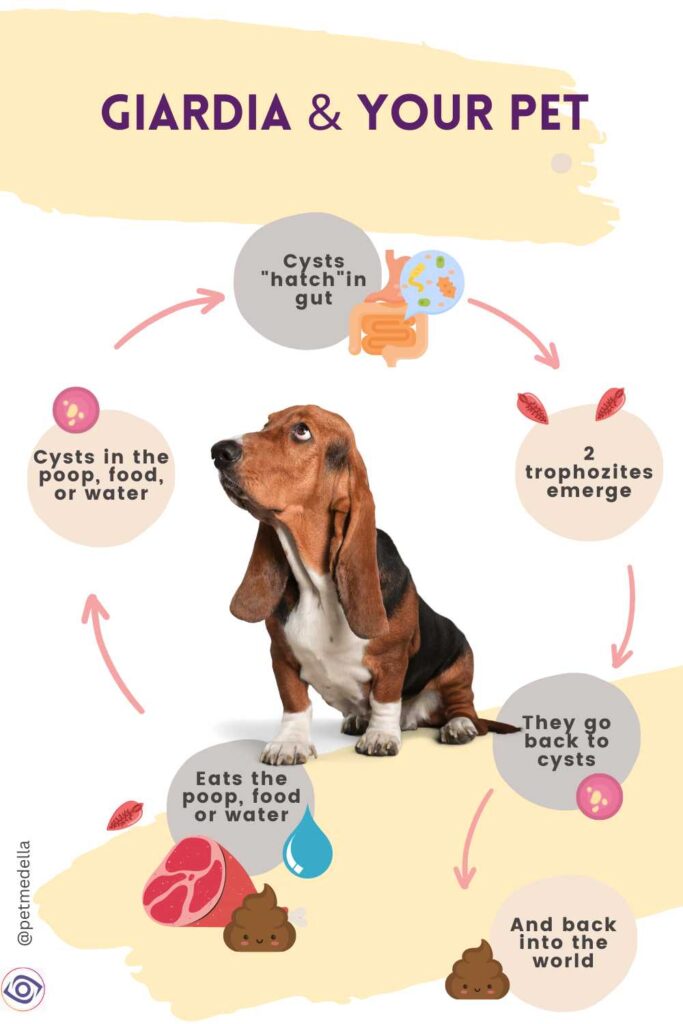
Giardia and Your Pet: What Pet Owners Need to Know
Giardia is a common protozoan parasite that affects both humans and animals. It is known to cause a variety of gastrointestinal symptoms and can be particularly problematic for pets. A pet can appear healthy and still have Giardia, according to the CDC.
As a pet owner, it is important to understand:
- What Giardia is
- How it is transmitted
- How to prevent Giardia
We’ll also talk about natural support for Giardia and your pet, although we always recommend you consult your licensed veterinary care provider for your pet, if you ever suspect a health condition.
Let’s explore this common microbe to help you better understand Giardia, and keep your pets healthy.
Giardia and Your Pet: An Introduction
Giardia is a microscopic parasite that lives in the intestines of humans and animals. It is particularly common in dogs and cats, but can also infect livestock, wildlife, and even humans.
Want to read about humans and Giardia? Head over to this post!
Giardia and Your Pet: Transmission
Giardia is a single-celled parasite that has a distinct pear or teardrop shape. It lives in the intestines of infected animals and is shed in their feces. The parasite is transmitted when an animal ingests contaminated food, water, or soil. This can happen when a pet drinks from a contaminated water source, eats contaminated food, or comes into contact with feces from an infected animal. The parasite can also be transmitted through direct contact with an infected animal.
The parasite is spread through the feces of infected animals and can survive in the environment for several months. Giardia infections are more common with poor sanitation, and sadly, this can be pet stores, animal shelters, and breeding facilities.

Giardia and Your Pet: Symptoms
Giardia infections can cause a range of gastrointestinal symptoms in pets, including:
- diarrhea
- vomiting
- weight loss
Some pets may also experience lethargy, loss of appetite, and dehydration. The severity of symptoms can vary depending on the age and health of the animal, as well as the degree of infection. In some cases, pets may be asymptomatic carriers of the parasite, meaning that they show no signs of illness but can still transmit the infection to other animals.
Giardia and Your Pet: Identifying
Identifying Giardia in pets can include a stool test. A veterinarian will examine a sample of your pet’s poop, under a microscope, for the presence of Giardia cysts. If the test is positive, your veterinarian will recommend treatment, which may include medication to kill the parasite and manage symptoms.
This is where many ask us, “Is there a natural support for Giardia and your pet?” There are supports for your pet, when your pet is going through veterinary care, or you are trying to figure out what Is wrong with your pet! It’s always important to note, that we do not diagnose or treat here at Petmedella, but we do offer energy testing and natural remedies that are adjunctive, that support your pet’s body systems in times of stress. Giardia IS stressful on the digestive tract of your dog!
Giardia and Your Pet: Prevention
Preventing Giardia in pets requires good hygiene practices. This includes providing clean, fresh water and food, regularly cleaning and disinfecting your pet’s living quarters, and promptly removing feces from your yard or litter box. Avoid letting your pet drink from stagnant water sources, such as puddles or ponds, and keep them away from areas where wild animals may be present.
If you suspect that your pet has been exposed to Giardia, it is important to have them tested as soon as possible. Early detection and treatment can help prevent the spread of the infection to other pets and humans. After connecting with your vet, the best option for bioenergetic testing with PetMedella is the Full Scan!
Giardia and Your Pet: Support
There are many things you can do for your pet while going through this common nuisance of giardia.
- Make sure your pet has adequate hydration: water, bone or vegetable broth (salt and onion free), fermented goat milk, all provide hydration and nutrients.
- Consider BioCell Salts to support mineral balance in your pet. New to Cell Salts? Read this next!
- Probiotics are great at any time, but especially when your dog has digestive issues or is on medication.
- Keep your home clean while Giardia visits!
If your pet has Giardia, it is important to take steps to prevent the spread of the infection in your home. This includes thoroughly cleaning and disinfecting all surfaces that may have come into contact with infected your pet’s feces, including floors, carpets, and bedding. Make sure to use the hot setting as the hear will kill the cysts.
Clean and disinfect pet bowls and toys as well. This can easily be done in your dishwasher!
Do you have a hot steam mop? This is an effective way to kill the cysts that live outside your pet, in poop, and food! You will see recommendations to use a solution of 1 cup of bleach to 1 gallon of water, sitting on the surface for 10 minutes, to kill the cysts. We test for this as a sensitivity on our Scanning Process.
Bleach is an endocrine disruptor, so use it wisely. Unfortunately, it may have to be used to kill the stubborn cysts in your environment. Another options is Apple Cider Vinegar, which needs a 60 minute contact time for killing Giardia cysts.
Allow the solution to sit on the surface for at least 10 minutes before rinsing with clean water. Be sure to wear gloves and avoid contact with the bleach solution, as it can cause skin irritation.
Giardia and Your Pet: FAQs!
Can humans get Giardia from pets?
Yes, humans can contract Giardia from infected pets. This is why it is important to practice good hygiene and regularly test pets for the infection.
Is Giardia contagious?
Yes, Giardia is highly contagious and can be easily spread between animals and humans.
How long does it take for Giardia to show up in a fecal test?
It can take up to 2 weeks for Giardia to show up in a fecal test after exposure. This is why starting support early is helpful!
Giardia and Your Pet: Takeaways!
Giardia is a common parasite that can affect both pets and humans.
It is highly contagious and can cause serious digestive problems if left untreated. Preventing the spread of Giardia requires good hygiene practices, such as regularly cleaning and disinfecting your pet’s living quarters, providing clean water and food, and promptly removing feces from your yard or litter box. If you suspect that your pet has been exposed to Giardia, it is important to have them tested as soon as possible to prevent the spread of the infection to other pets and humans.
Pets can transmit Giardia to humans through contact with infected feces.
This can occur when handling pet waste, cleaning litter boxes, or coming into contact with contaminated surfaces. Good hygiene practices, such as washing hands thoroughly with soap and water after handling pets or cleaning up after them, can help prevent the spread of the infection.
When in doubt, consider Bioenergetic Testing for the energetic signature of toxins like Giardia. This will provide a custom tested list of remedies for any imbalances with your pet.
